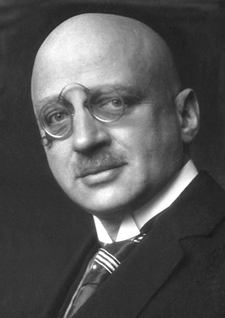Fritz Haber
| Fritz Haber | |
|---|---|

Fritz Haber, c. 1919
|
|
| Born |
9 December 1868 Breslau, Prussia |
| Died | 29 January 1934 (aged 65) Basel, Switzerland |
| Nationality | German |
| Fields | Physical chemistry |
| Institutions |
Swiss Federal Institute of Technology University of Karlsruhe |
| Alma mater |
University of Heidelberg, Humboldt University of Berlin Technical University of Berlin |
| Doctoral advisor | Robert Bunsen |
| Known for |
Haber process Born–Haber cycle Fertilizer Haber–Weiss reaction Chemical warfare Second Battle of Ypres Explosives |
| Notable awards | Nobel Prize in Chemistry (1918) Rumford Medal (1932) |
| Spouse |
Clara Immerwahr (1901–1915; her death; 1 child) Charlotte Nathan (1917–1927; divorced; 2 children) |
Fritz Haber (German: [ˈhaːbɐ]; 9 December 1868 – 29 January 1934) was a German chemist who received the Nobel Prize in Chemistry in 1918 for his invention of the Haber–Bosch process, a method used in industry to synthesize ammonia from nitrogen gas and hydrogen gas. This invention is of importance for the large-scale synthesis of fertilizers and explosives. The food production for half the world's current population depends on this method for producing nitrogen fertilizers. Haber, along with Max Born, proposed the Born–Haber cycle as a method for evaluating the lattice energy of an ionic solid.
Haber is also considered the "father of chemical warfare" for his years of pioneering work developing and weaponizing chlorine and other poisonous gases during World War I, especially his actions during the Second Battle of Ypres.
Fritz Haber was born in Breslau, in Prussian Silesia (now Wrocław, in western Poland), into a well-off Jewish family. The family name Haber was a common one in the area, but Fritz Haber's family has been traced back to a great-grandfather, Pinkus Selig Haber, a wool dealer from Kempen. An important Prussian edict of 13 March 1812 determined that Jews and their families, including Pinkus Haber, were "to be treated as local citizens and citizens of Prussia". Under such regulations, members of the Haber family were able to establish themselves in respected positions in business, politics, and law.
...
Wikipedia
